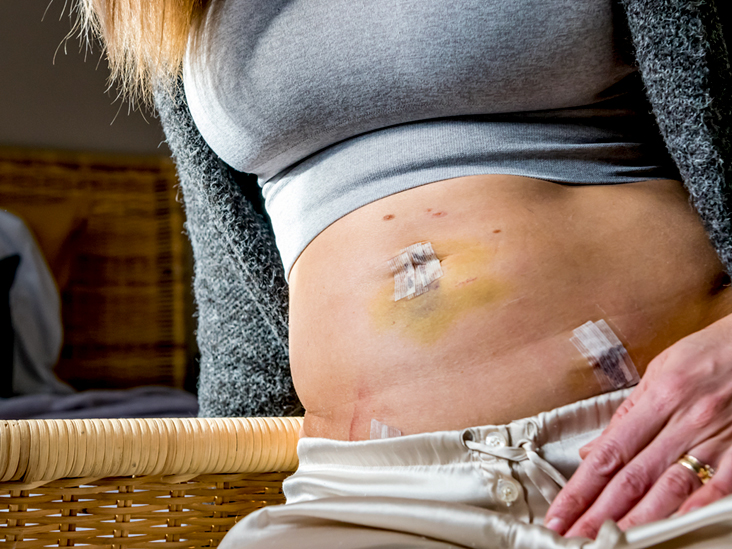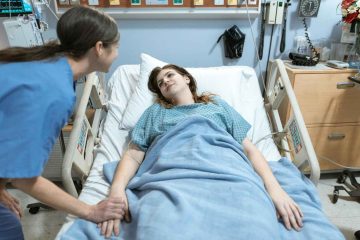
You will need to spend a short time recovering in hospital after a hysterectomy. Depending on what procedure you had, your recovery time at home before you can resume normal activities will vary.
Abdominal hysterectomy. The majority of women return home within two days. However, complete recovery can take anywhere from six to eight weeks. You should rest at home during this time. Talk with your doctor to discuss restrictions before you attempt any task. Do not lift anything for the first 2 weeks. Walking is recommended, but not heavy lifting. You can resume your normal activities after 6 weeks.
Vaginal (or laparoscopically assisted vaginal) hysterectomy (LAVH). Recovery can take as little as two weeks. The majority of women return home within a few days. Walking is encouraged but not for heavy lifting. For at least six weeks, you will be required to refrain from having sex.
Laparoscopic supracervical hysterectomy (LSH) This procedure can be performed in as little as six days to two weeks. Walking is recommended, but not for heavy lifting.
Robotic hysterectomy. Robotic arms mimic the surgeon’s movements and make tiny incisions to remove the uterus. The majority of women return home within 24 hours. You will be subject to the same restrictions if the cervix has been removed as an LAVH.
If you experience any following symptoms after a hysterectomy, please consult your doctor.
- Chills or fever
- Vaginal discharges that are unusual or heavy bleeding
- Extreme pain
- Incisions may cause redness or discharge
- Probleme with urinating and bowel movements
- Breathing difficulties or chest pain
The Hysterectomy Recovery
Most women feel that life without a female uterus is better than dealing with the symptoms of a hysterectomy, such as bleeding, pain in the pelvis, and bloating. Women may enjoy better sex if they are able to get rid of these symptoms.
There are still some challenges if your ovaries are removed. You will likely experience symptoms of menopause if you have not experienced menopause since your hysterectomy. These include hot flashes, mood swings, and mood swings. Your body is adapting to hormone changes. There may be changes in your sexual desire, enjoyment, or vaginal dryness. Because of the potential for severe bodily changes, hormone replacement therapy is usually started before women leave the hospital.
It is possible to feel a sense of loss. It is possible to grieve the loss of your uterus or your ability for children. You may feel depressed if you have had surgery due to illness or cancer. These feelings are normal. These feelings are normal. Talk to your doctor or a mental health therapist. However, most women are content after a hysterectomy.
Side effects of Hysterectomy: Treatment
Hormone replacement therapy (HRT) might be an option if your ovaries and uterus are removed. This will help to alleviate some symptoms. Consider your age and your medical history when considering HRT. Discuss it with your doctor.
Non-hormonal treatments are also available. Effexor, Clonidine (a blood pressure medication) and Neurontin (prescribed to treat seizures and chronic pain) are effective in treating hot flushes.
Some women experience pain during intercourse after a hysterectomy. You can try different positions, lubricants, and moisturizers (such as Replens or K-Y oils). Vaginal dryness can be relieved by a low-dose vaginal estrogen cream or suppository and a ring.
Sometimes, a hysterectomy can cause pelvic weakness. Pelvic weakness can worsen after surgery. This could lead to bladder or intestinal problems. To control incontinence issues, Kegel exercises can strengthen the pelvic muscles. Corrective surgery may be necessary for some women.
Short and Long-Term Side Effects of Dicyclomine
January 7, 2026Stage 4 Lung Cancer: Symptoms, Care & Treatments
December 29, 2025Best Cold Medicine: Fast Relief Options For Today
December 27, 2025
Leave a reply Cancel reply
You must be logged in to post a comment.
-
Shoes Sandals
February 26, 2020 -
How a Support Coordinator Helps You Achieve Your Goals
March 26, 2025 -
Sure Signs you ve Already had Covid
February 10, 2022





